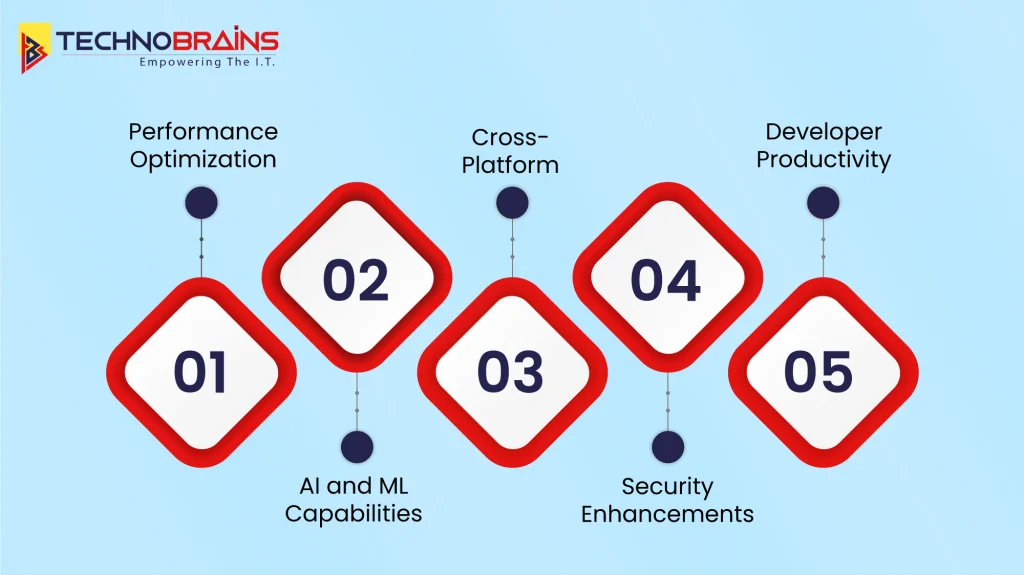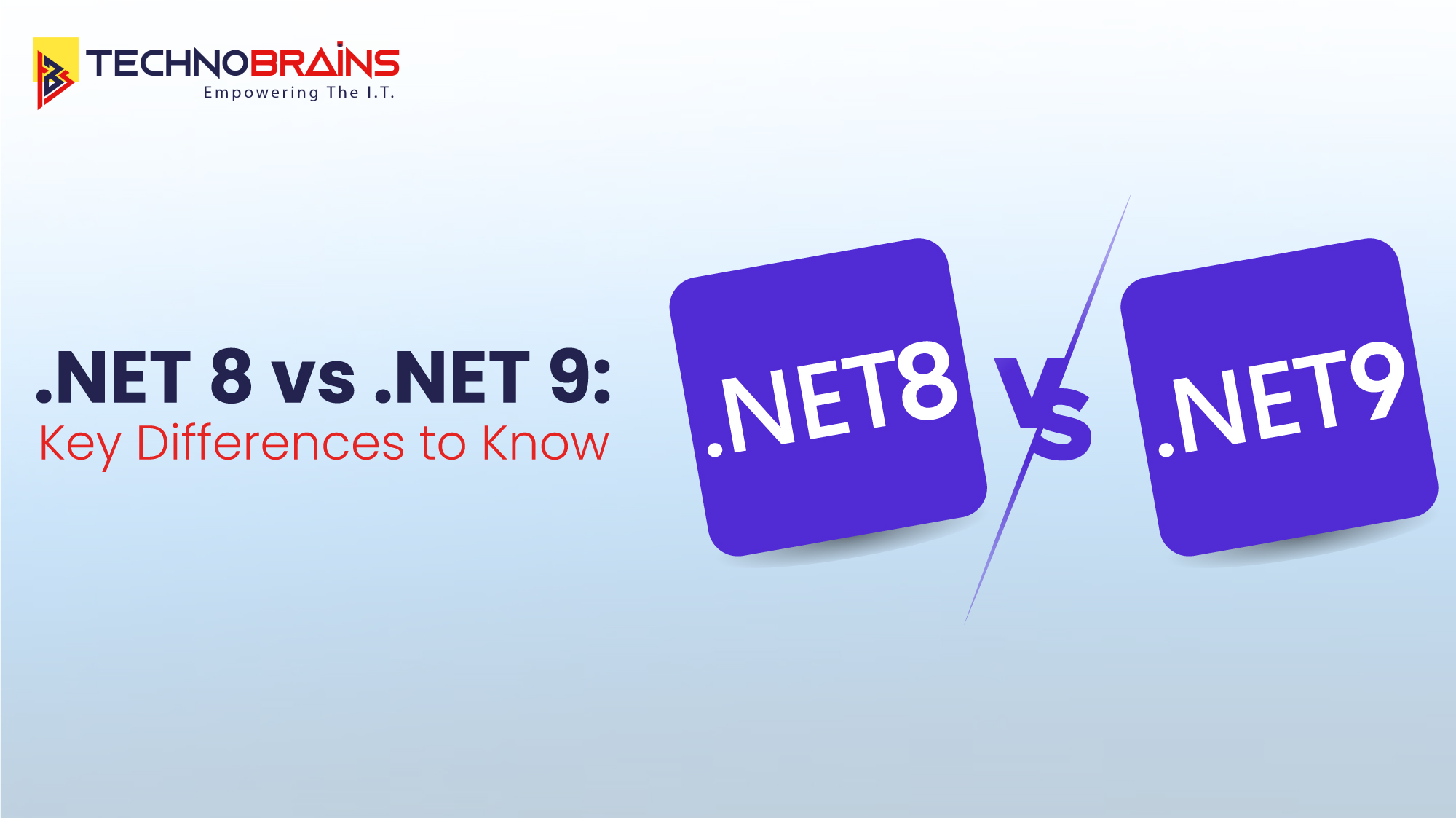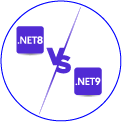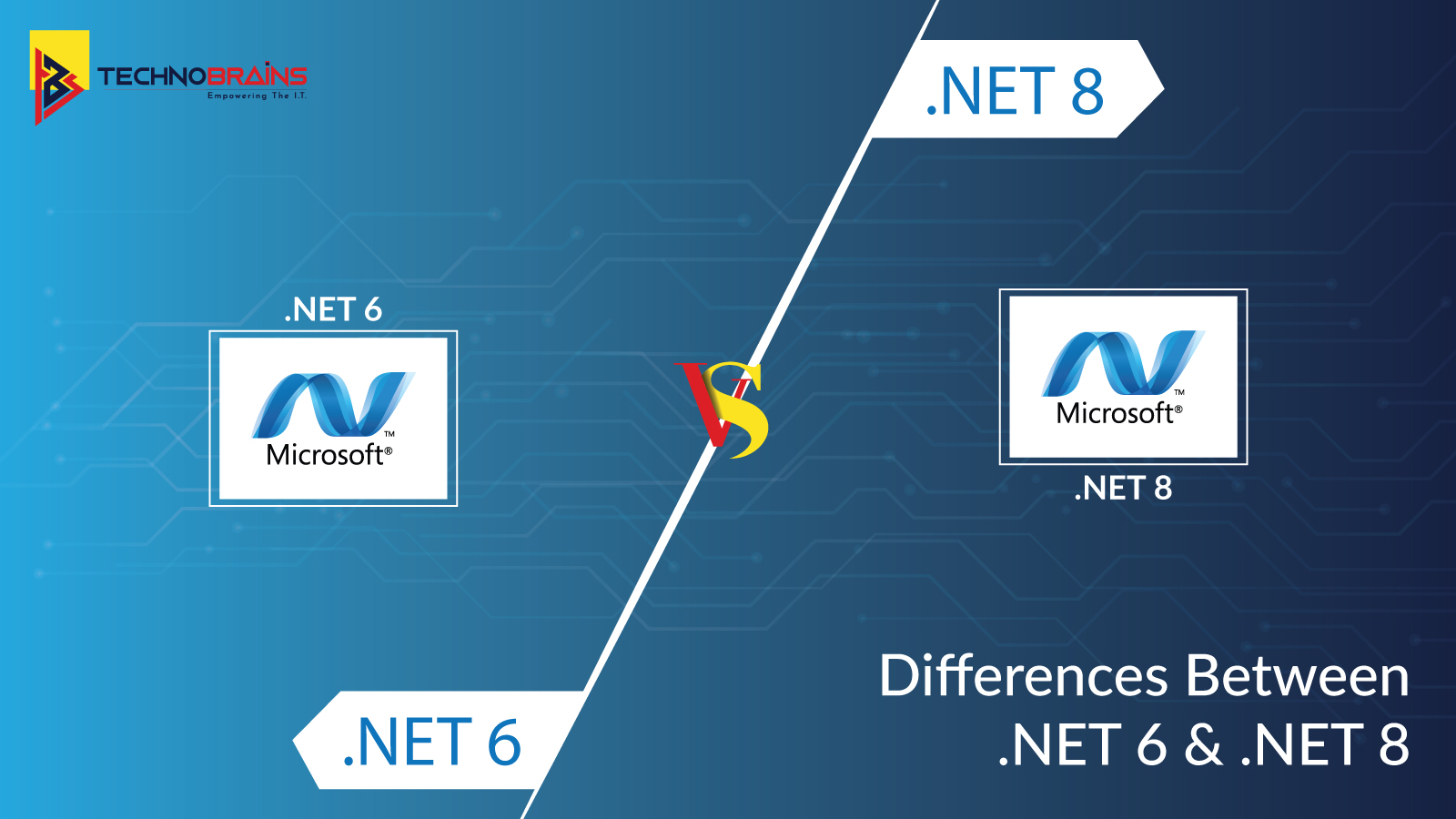Get 40 Hours Free Developer Trial
Test Our Developers for 40 Hours at No Cost - Start Your Free Trial →
Both .NET 8 and .NET 9 are feature releases, each bringing huge value to the .NET ecosystem. While .NET 8 focuses on developer productivity and performance, .NET 9 goes the extra mile with advanced AI integrations and even better cross-platform capabilities. Along with the .NET 9 new features and a significant leap propels the framework into an era of smarter and more adaptive development.
- The .NET 8 is laser-targeted on performance and security, while it notably supports the cloud.
- .NET 9 Advanced AI tools; expanded cross-platform support; more enhancements on cloud-native .NET development services.
What Would Be The Difference Between .NET 8 vs .NET 9?
A simplified point of view that shall help in understanding the difference between .NET 8 vs .NET 9:
.NET 8: The foundation for cloud-native performance apps. This came with improved memory management, one that had increased security protocols and more streamlined developer tools.
.NET 9: Upgrading .NET 8 further, to include machine learning capabilities; even further, it brought support for mobile and cloud solutions with updated tools that make cross-platform application development easier. .NET 9 is an enhanced version, which also extends .NET 8 in its underlining of the support of smart features and artificial intelligence compatibility.
Detailed Comparison Between .NET 8 and .NET 9
The following comparison between .NET 8 vs .NET 9 tries to paint a very good picture of incremental improvements from .NET 8 to .NET 9, especially in areas related to AI, cross-platform support, and security. Below is a tabulated summary of some of the most critical differences between .NET 8 and .NET 9:
| Features | .NET 8 | .NET 9 |
| Performance | Enhanced memory management, faster runtime | Further optimized with new runtime features |
| AI Integration | Basic ML libraries available | Advanced AI and ML capabilities |
| Cross-Platform Support | Windows, macOS, Linux | Expanded to support mobile and IoT devices |
| Security | Improved security protocols | Reinforced with AI-driven security features |
| Cloud-Native Features | Enhanced for cloud compatibility | Increased support for multi-cloud platforms |
| Developer Tools | Advanced debugging and profiling tools | AI-assisted debugging and code suggestions |
| Compatibility | Supports legacy .NET applications | Improved backward compatibility |
Differences Between .NET 8 and .NET 9: Key Factors Comparison
There is a lot of difference between .NET 8 vs .NET 9. Version .NET 8 and .NET 9 have brought in facilities that have increased their reliability and efficiency. Following are some of the most important factors that are used for the comparison between the two versions:

1. Performance Optimization:
.NET 8 brought in a lot of speed and memory efficiency improvements. .NET 9 continues atop the latter with some runtime refinements to make applications faster and more fluid, especially when run under heavy workloads.
2. AI and Machine Learning Capabilities:
Equipped with a suite of state-of-the-art tools for AI and machine learning, .NET 9 empowers developers to craft intelligent apps. While .NET 8 had some base-level machine learning libraries, there was much more capability for furtherance on apps using .NET 9 with an advanced set of tools.
3. Cross-Platform:
.NET 8 supported Windows, macOS, and Linux fully in both desktop and web applications. .NET 9 extends this to include extensive compatibility with mobile, IoT, and cloud. It makes .NET an inclusive platform where one can develop applications for several devices.
4. Security Enhancements:
.NET 8 placed much emphasis on security through stronger protocols and methods of encryption. .NET 9 introduces further addition of more AI-driven security features for real-time threat detection.
5. Developer Productivity:
Whereas .NET 8 introduced some new debugging functionalities that made the process of identifying issues in code very easy, .NET 9 has taken developer experiences one notch forward by introducing AI-driven code suggestions and the detection of a variety of errors.
Read Also, .NET 6 vs .NET 8: What You Need to Know
Should I Upgrade to .NET 9 From .NET 8?
This is one of the most common questions when we think about the .NET 8 vs .NET 9. In case you are thinking how to upgrade to .NET 9 or even why to do so. Don’t worry we got you. Upgrading to .NET 9 from .NET 8 will be very compelling, especially if the AI, machine learning, and increased cross-platform support it brings to bear can benefit your application. Indeed, for teams working in a multi-cloud or mobile environment, this extended compatibility of .NET 9 is invaluable. One can have a lot of confusion if not aware of the detailed comparison between .NET 8 vs .NET 9.
The AI-driven tools and a range of Features of .NET 9 help enhance those development workflows with an intelligent debugger and code completions. However, if you’re currently stable on .NET 8 and none of these new capabilities are required, it could be cheaper to stay on .NET 8 until a major release. The reliable .NET Development Company stays updated with the newer features rolling out with the .NET 9.
Should .NET Development Companies Prefer .NET 9 Over .NET 8?
Here is a simple explanation. NET 9 presents some very interesting prospects. With integrated AI, greater cross-platform support, and cloud-friendly tools, .NET 9 will be a powerhouse that will help position applications for the future. In any case, .NET 8 is still a good option in case the application does not need all that AI or the expansion in mobile phones. It depends upon the needs and resources of the company in question.
Conclusion
While there is a lot of talk about What are the differences between .NET 8 and .NET 9 both .NET 8 and .NET 9 have their own merits, and that is a choice depending on what the variant types of development goals are. .NET 9 would be quite a good selection for corporations and developers looking to build intelligent apps for the future. Give a thorough inspection when you opt for quality developers you can always count to hire .NET Developers from us as we have the best of the industry experts that know how to keep up with scalable projects and be innovative at the same time.
Are you looking for effective Software development solutions? Get in touch to get positive results.











